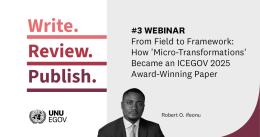This workshop, part of UNU-CPR's Global Governance Innovation Platform, convened several global alliances in Dresden to collect insights that can inform the design of new multilateral mechanisms across a range of thematic areas - from sovereign debt to plastic pollution.
Session 1
The goal of the first session was to orient participants to the diversity of alliances represented at the workshop. Specifically, each representative provided an overview of their alliance and the broader context in which it was established, highlighting how its unique institutional design enabled an effective response to a global challenge. This helped participants gain a deeper understanding of each alliance’s institutional structure, the rationale behind its design and the key actors or forces that shaped its development. They were also invited to share reflections on the formative period of their alliance, with a focus on how it helped to unlock or enable cooperation.
Session 2
Several major multilateral processes have called for governance innovation to tackle enduring and new global challenges. Analysis of the 2023 SDG Declaration, the 2024 Pact for the Future and Global Digital Compact, and the draft outcome document for the 2025 FFD4 reveals a shared interest in core governance features – particularly effective transparency, accountability and decision-making mechanisms.
There is also notable emphasis on innovative financing approaches and inclusive consultation processes. Member States frequently ask about the mechanics of decision-making, such as voting procedures, agenda-setting practices and the structure of executive boards and secretariats. While these questions may appear technical, they often prove to be critical hurdles in securing government support for new institutional arrangements.
The goal of this session was to highlight distinctive governance mechanisms, procedures, or processes within each alliance. Participants were invited to consider:
- What lessons can the UN membership draw from these institutional and procedural design choices?
- How might these features inform the development of new mechanisms currently under discussion in areas such as digital governance, debt governance and climate and environmental governance?
- Are there elements unique to their alliances that have helped build momentum, foster compromise or enable cooperation on your thematic issues?
The workshop was co-hosted by UNU-CPR and UNU-Flores, with funding from Germany's Federal Ministry for Economic Cooperation and Development (BMZ).





